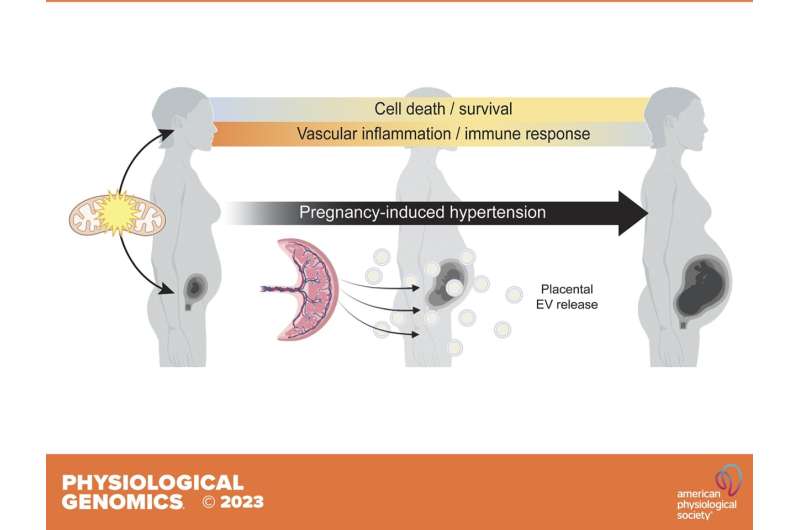This article has been reviewed according to Science X's editorial process and policies. Editors have highlighted the following attributes while ensuring the content's credibility:
fact-checked
trusted source
proofread
Mitochondrial changes linked to high blood pressure in pregnancy

High blood pressure (hypertension) that occurs during pregnancy is associated with dangerous health outcomes for both the pregnant person and fetus. New research on changes in mitochondrial gene expression sheds light on possible contributing factors to these disorders. The study is published ahead of print in Physiological Genomics.
Hypertensive disorders of pregnancy, which include preeclampsia and gestational hypertension, are among the leading causes of pregnancy-related deaths. Researchers from Loma Linda University in California and the University of North Texas Health Science Center examined two gene expression data sets from the National Center for Biotechnology Information Gene Expression Omnibus.
They selected sets that included data from samples at different stages of gestation from pregnant people with and without pregnancy-induced hypertension. From these, the researchers calculated changes in mitochondrial gene expression over time in parent and placenta by analyzing their transcriptomes—the complete set of all RNA in a cell or tissue.
Transcriptomes change under different circumstances. Studying those changes can give insight into what genes are active under different conditions. The research team found 30 parental and nine placental mitochondrial genes that were expressed differently in the hypertensive groups. These genes differed between parent and placental tissue.
In the parental set, the differentially expressed genes were associated with inflammation, cell death and placental development. In the placenta, they were genes associated with an increased number of extracellular vesicles or membrane-bound particles released from cells. Increased placental extracellular vesicles and inflammation have both been documented in preeclampsia.
This study provides evidence for the possibility that mitochondrial dysregulation could be a contributing factor in the development of hypertensive disorders of pregnancy. More research is needed, but it may also "suggest that mitochondria may mediate maternal-fetal interactions during healthy pregnancy," the study states.
"Converging or common mitochondria-mediated pathways underlying development of gestational hypertension and preeclampsia warrant further investigation," the researchers conclude.
More information: Contessa A. Ricci et al, Maternal and fetal mitochondrial gene dysregulation in hypertensive disorders of pregnancy, Physiological Genomics (2023). DOI: 10.1152/physiolgenomics.00005.2023

















